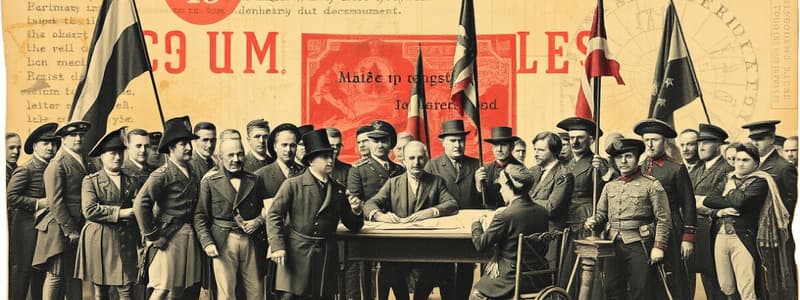Podcast
Questions and Answers
What was the purpose of the Committee of Public Safety?
What was the purpose of the Committee of Public Safety?
- To control foreign relations
- To establish a monarchy
- To supervise food distribution (correct)
- To provide defense of France during the Revolution (correct)
The Reign of Terror resulted in the execution of around 15,000 to 50,000 French citizens.
The Reign of Terror resulted in the execution of around 15,000 to 50,000 French citizens.
True (A)
Who was the leader of the Committee of Public Safety?
Who was the leader of the Committee of Public Safety?
Maximilien Robespierre
What did the Directory consist of?
What did the Directory consist of?
What major change did Napoleon bring upon returning to France in 1799?
What major change did Napoleon bring upon returning to France in 1799?
The civil code established by Napoleon was known as the ______.
The civil code established by Napoleon was known as the ______.
What was the main opposition Napoleon faced during the expansion of the Grand Empire?
What was the main opposition Napoleon faced during the expansion of the Grand Empire?
The Continental System aimed to promote trade between France and Britain.
The Continental System aimed to promote trade between France and Britain.
Flashcards
Committee of Public Safety
Committee of Public Safety
Established in 1793 by the National Convention to manage France during the Revolution, focusing on defense and food distribution.
Reign of Terror
Reign of Terror
A period from autumn 1793, led by Robespierre and the Jacobins, to suppress internal threats, resulting in executions.
Maximilien Robespierre
Maximilien Robespierre
A radical Jacobin leader and architect of the Reign of Terror, advocated for the execution of King Louis XVI.
Directory
Directory
Signup and view all the flashcards
Napoleon Bonaparte
Napoleon Bonaparte
Signup and view all the flashcards
Civil Code (of Napoleon)
Civil Code (of Napoleon)
Signup and view all the flashcards
Grand Empire
Grand Empire
Signup and view all the flashcards
Continental System
Continental System
Signup and view all the flashcards
Study Notes
Committee of Public Safety
- Established by the National Convention in 1793 to defend France during the Revolution and manage food distribution.
- Led by Maximilian Robespierre and Georges Danton, responsible for setting prices and raising an army against invasions.
- Robespierre assumed leadership in 1758 after Danton's failure to address war crises.
- Advocated for a “republic of virtue,” which aimed at reeducating citizens but led to internal conflicts and his downfall in 1794.
Reign of Terror
- Initiated in autumn of 1793 under Robespierre and the Jacobins to counter perceived threats within France.
- Resulted in a widespread purge, targeting anyone with perceived counterrevolutionary sentiments.
- Approximately 15,000 to 50,000 citizens were executed by guillotine, including former allies like Georges Danton.
Maximilien Robespierre
- A key leader from 1758 to 1794, radical Jacobin, and architect of the Reign of Terror.
- Instrumental in drafting the Declaration of the Rights of Man and Citizen.
- Advocated for the execution of King Louis XVI and mobilized citizens against the aristocracy.
- Eventually arrested and executed by the National Convention along with 21 allies.
Directory
- Established by the constitution of 1795, the Directory consisted of an executive body of five directors.
- Elected by the Council of Elders and supported by the military to maintain power.
- Faced opposition from both left-wing radicals and right-wing royalists while exaggerating threats of foreign invasion.
- Civil liberties were limited, leading to discontent and plans for a military coup by Jacobins.
Napoleon Bonaparte
- Born in 1769, he emerged as a military genius with impressive victories in Italy before becoming a military dictator in 1799.
- Collaborated with Sieyès to orchestrate a coup against the Directory and established himself as first consul.
- His rule effectively marked the end of the French Revolution.
Civil Code (of Napoleon)
- Implemented a comprehensive legal framework for property, family, and individual rights post-revolution.
- Strengthened male authority, stripped women of rights, and limited rights for illegitimate children.
- Granted equal legal rights to all male citizens and the right to religious dissent, while colonial slavery was reinstated.
- Influenced laws across Napoleon's territories and several European nations.
Grand Empire
- Formed around 1805, following French territorial expansion across the continent.
- Core of the empire centered in France and included parts of Italy, reliant on allies like Russia, Austria, and Prussia.
- Nationalistic sentiments emerged due to French successes, detracting from the stability of the empire.
Continental System
- A flawed strategy initiated in 1806 to weaken Britain by banning British ships from European ports through the Berlin and Milan Decrees.
- Led to British retaliation with naval blockades that disrupted trade throughout Europe, contributing to Napoleon’s decline.
Studying That Suits You
Use AI to generate personalized quizzes and flashcards to suit your learning preferences.




